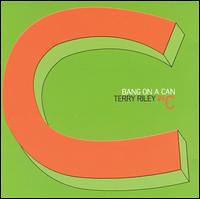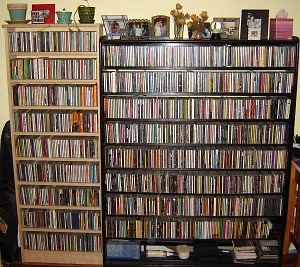Don’t Believe the Hype (Except When You Want To)
Artists: Autoclave; Bang on a Can
Album: Autoclave; Terry Riley/In C
Source: Bought new
With magic, knowing how the trick is done not only ruins the fun, but it also removes the power of the act: you know it’s really a secret switch and a trap door making the bird disappear, which replaces the brief thrill of belief with the dull disappointment of easy knowledge.
The system by which musicians and/or record companies convince you to buy their product is a sort of magic trick, if not a very complicated one. The people selling the music get the people reviewing or writing about the music excited, who are then expected to flip their secret switches and transfer their excitement onto the record-buying public. The reviewer/writer gets excited in a few ways: sometimes he just genuinely likes the record, but even then there’s a craftily assembled press kit, a free copy of the album, maybe a cool promo item like a baseball cap or limited-edition something-or-other, probably free tickets to the show, and often an interview opportunity, which can be its own kind of excitement.
It’s a simple trick, and it works. Once enough of these people get at least a little excited, a low hum begins to build as writers for several magazines, newspapers, websites, etc, all start to project their excitement outward (read enough of them and you’ll start to see a few lines and tropes that everyone is clearly lifting right from the press release). Soon the record buyer has heard the Good News 10 times in a week, and before you know it he really, really wants to buy the new CD by a band he hasn’t thought about in awhile.
The amazing thing about this trick is that knowing how it’s done doesn’t make you immune to it. (This process recently put the idea in my head, if only briefly, of buying the new David Gilmour album, even though I don’t listen to the other 2 Gilmour records I already have and only a fraction of the Pink Floyd I loved as a depressive teen.) I’ve been a part of the machine, and I know how it works, but I still sometimes find it hard to not believe the hype.
This Autoclave record is something I still can’t believe I own. It’s a (very) short compilation of the singles & demos recorded by this (very) short-lived D.C. band, put out by capitol-scene avatars Dischord. The main draw is that it’s the first band of Mary Timony, later of indie-pop stars Helium. Now, I never listened to Autoclave during their 1990-91 existence; I did listen to Helium, and even saw them live once or twice, and never liked them. But when the machine revved up and the rabbit was repeatedly pulled out of the hat, I suddenly had to hear these early, pre-Helium recordings by Mary Timony. I don’t know why. But I bought it, and I liked it about as much as Helium, which is to say not very much. I think it’s kind of boring, if inoffensively so.
But the trick isn’t always malicious. One day at work, I was listening to NPR and John Schaeffer had minimalist composer Terry Riley on the show. Schaeffer is one of those perfect patsies, a professional music geek who gets excited about new records and does so in front of a microphone. He and Riley talked about how amazing Bang on a Can’s live recording of Riley’s classic piece “In C” was, and they played a clip on the radio. And you know what? They were right. It was amazing. I needed to hear more of it. Now. I immediately went to Barnes & Noble’s website, knowing that they had same-day delivery in Manhattan, and ordered In C. Later that day, it was brought to my office, and it still kind of blows my mind every time I listen to its one track, featuring a dozen musicians running through repeating explorations of a chord for 40 minutes. It’s easily the best piece of minimalist modern classical with electric guitar and glockenspiel that I own. Well, it’s the only, but it’s also a perfectly fluffy, two-eared rabbit, drawn flawlessly out of a hat held by a chain of magicians who smoothly conjured up just enough belief in the magic they were selling.
SISOSIG?: This one’s pretty easy: I never liked the Autoclave, and it only set me back $9 a decade ago. No loss in losing it. The Bang on a Can, though, is a keeper, and has already been a gateway drug to other modern classical, a nice new avenue of musical adventure.
Album: Autoclave; Terry Riley/In C
Source: Bought new
With magic, knowing how the trick is done not only ruins the fun, but it also removes the power of the act: you know it’s really a secret switch and a trap door making the bird disappear, which replaces the brief thrill of belief with the dull disappointment of easy knowledge.
The system by which musicians and/or record companies convince you to buy their product is a sort of magic trick, if not a very complicated one. The people selling the music get the people reviewing or writing about the music excited, who are then expected to flip their secret switches and transfer their excitement onto the record-buying public. The reviewer/writer gets excited in a few ways: sometimes he just genuinely likes the record, but even then there’s a craftily assembled press kit, a free copy of the album, maybe a cool promo item like a baseball cap or limited-edition something-or-other, probably free tickets to the show, and often an interview opportunity, which can be its own kind of excitement.
It’s a simple trick, and it works. Once enough of these people get at least a little excited, a low hum begins to build as writers for several magazines, newspapers, websites, etc, all start to project their excitement outward (read enough of them and you’ll start to see a few lines and tropes that everyone is clearly lifting right from the press release). Soon the record buyer has heard the Good News 10 times in a week, and before you know it he really, really wants to buy the new CD by a band he hasn’t thought about in awhile.
The amazing thing about this trick is that knowing how it’s done doesn’t make you immune to it. (This process recently put the idea in my head, if only briefly, of buying the new David Gilmour album, even though I don’t listen to the other 2 Gilmour records I already have and only a fraction of the Pink Floyd I loved as a depressive teen.) I’ve been a part of the machine, and I know how it works, but I still sometimes find it hard to not believe the hype.
This Autoclave record is something I still can’t believe I own. It’s a (very) short compilation of the singles & demos recorded by this (very) short-lived D.C. band, put out by capitol-scene avatars Dischord. The main draw is that it’s the first band of Mary Timony, later of indie-pop stars Helium. Now, I never listened to Autoclave during their 1990-91 existence; I did listen to Helium, and even saw them live once or twice, and never liked them. But when the machine revved up and the rabbit was repeatedly pulled out of the hat, I suddenly had to hear these early, pre-Helium recordings by Mary Timony. I don’t know why. But I bought it, and I liked it about as much as Helium, which is to say not very much. I think it’s kind of boring, if inoffensively so.
But the trick isn’t always malicious. One day at work, I was listening to NPR and John Schaeffer had minimalist composer Terry Riley on the show. Schaeffer is one of those perfect patsies, a professional music geek who gets excited about new records and does so in front of a microphone. He and Riley talked about how amazing Bang on a Can’s live recording of Riley’s classic piece “In C” was, and they played a clip on the radio. And you know what? They were right. It was amazing. I needed to hear more of it. Now. I immediately went to Barnes & Noble’s website, knowing that they had same-day delivery in Manhattan, and ordered In C. Later that day, it was brought to my office, and it still kind of blows my mind every time I listen to its one track, featuring a dozen musicians running through repeating explorations of a chord for 40 minutes. It’s easily the best piece of minimalist modern classical with electric guitar and glockenspiel that I own. Well, it’s the only, but it’s also a perfectly fluffy, two-eared rabbit, drawn flawlessly out of a hat held by a chain of magicians who smoothly conjured up just enough belief in the magic they were selling.
SISOSIG?: This one’s pretty easy: I never liked the Autoclave, and it only set me back $9 a decade ago. No loss in losing it. The Bang on a Can, though, is a keeper, and has already been a gateway drug to other modern classical, a nice new avenue of musical adventure.



0 Comments:
Post a Comment
<< Home